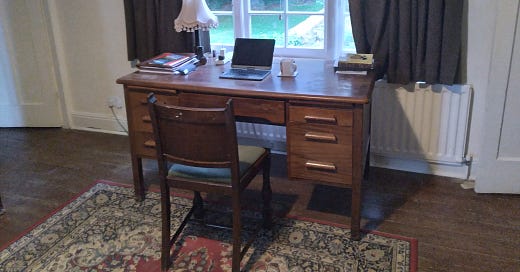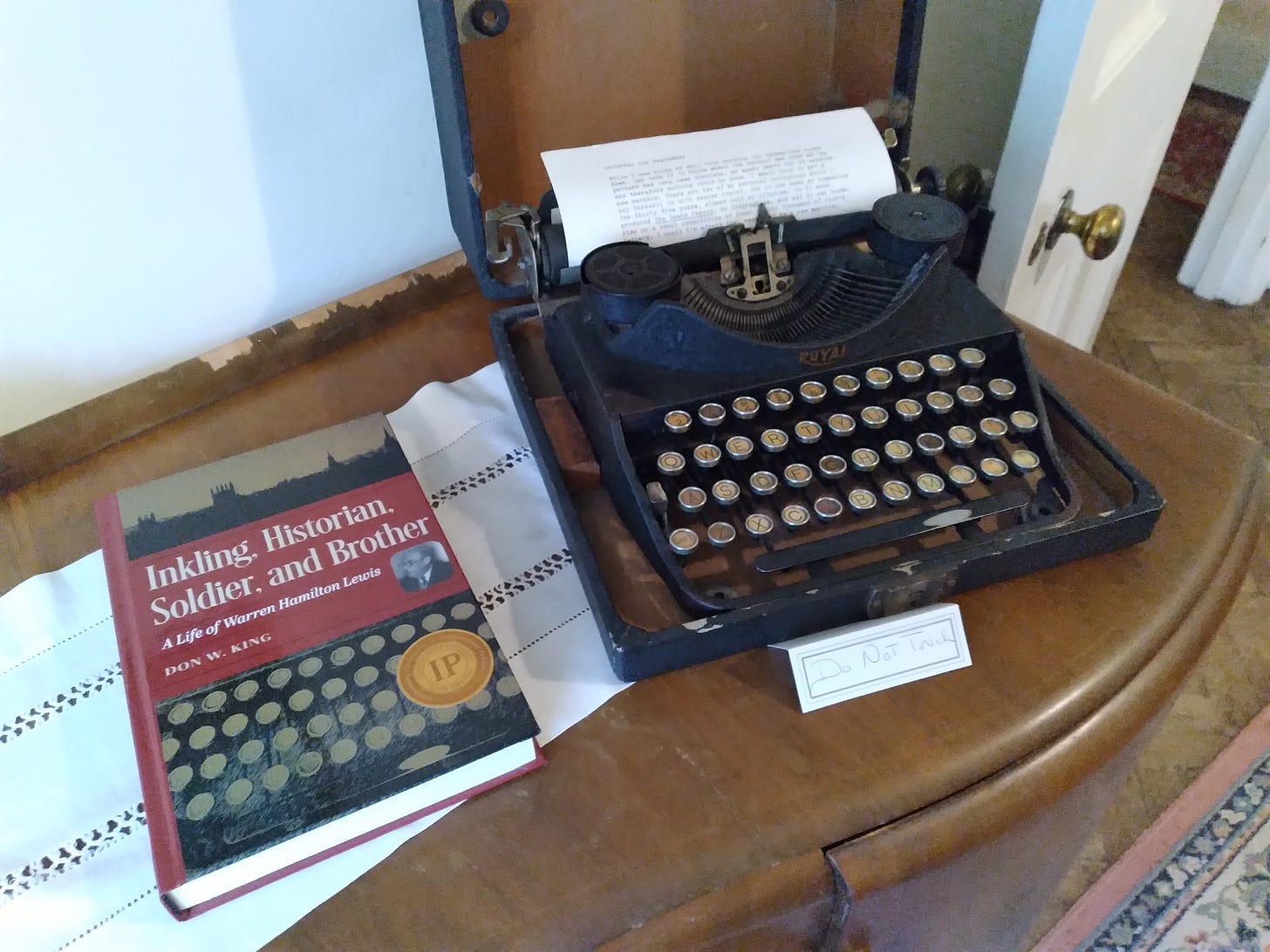The current view in Warren Lewis’s study at the Kilns, and where I am writing this post.
C. S. Lewis’s brother and life-long best friend was Warren Lewis, or “Warnie,” as he was called. In the neighbourhood on the outskirts of Oxford, he was “the Major.” Warnie was an important member of “the Inklings,” a worthy historian, an efficient Army officer, and a very important source for much that we know about his brother, “Jack.”
Don King, of Montreat College, has recently published the first comprehensive biography of Warnie: Inkling, Historian, Soldier, and Brother: A Life of Warren Hamilton Lewis (ISBN 978-1-60635-450-6). We have needed a work like this, and Don has met the challenge, viz., reading all the typed material that Warnie left us. Warnie was quite the archivist and diarist! Plus, Don has tracked down Warnie’s military record, which is quite illumining. Just recently, on a tour at the Kilns, I was asked if Warnie was ever in any danger during the wars. While it seems he was in no danger in France during the early days of World War II, Don recounts how he was in deadly danger during World War I.
Stylistically, Don’s writing can occasionally come across like raw research notes. For example, more than once he makes a very long list of items or adjectives used by Warnie about something. The material could have been handled more subtly, but who cares? We want the fruits of Don’s research; we want to know as much about Warnie as we can, and we are deeply appreciative of his labour.
I want to commend Don on a goal he set for himself. Early in the book, he writes that he does not want to wind up producing yet another biography of C. S. Lewis. He achieves this goal admirably. He includes Jack’s story just enough to illumine Warnie’s life; the material is never distracting. I found his dove-tailing of the two lives quite satisfactory.
Having a life-long interest in military history, I very much appreciated the chronology of Warnie’s military service and the stories that were included. I have also wondered how well Warnie’s books on French history were received by the public. Don provides an interesting survey of Warnie’s works, much like Walter Hooper covers Lewis’s books in his Companion and Guide, along with samplings from the reviewers. One learns that Warnie was a very well respected author and historian.
Three things stand out to me. First, is the way Don handles the different accounts of Mrs. Moore. Warnie’s complaints about her are well known to readers of Lewis’s biographies. Don includes the very positive description of her by people who did not live in the house with her. But when it comes to the negative experience of Warnie, Don argues that he should not be contradicted, for surely, no one could know her better but the residents in her house.
Next, is Don’s observation of how the personalities of the two brothers seem to have been traded in the early 1930’s (pp 112-114). Earlier in their lives, Jack was the introvert, while Warnie was outgoing and sociable. But after Jack became a Christian and Warnie retired from the military to the Kilns, they seem to have reversed roles. In fact, it was Warnie’s tendency toward introspection which aggravated his problem with alcohol.
Speaking of alcohol, my last point is the comment that Don makes about how Warnie’s involvement with the Inklings adversely affected his attempts to control his drinking. We know that the Inklings - as I think Tolkien put it - could get “well oiled.” So, we ask, should Warnie not have attended the meetings? The problem with that, however, is that the society of the Inklings was a significant benefit to Warnie. Such society was very much what Warnie needed emotionally. To not have been able to attend the meetings - let’s say, if he had been enfeebled in some fashion - would have been just the kind of thing to make him think about drinking! It’s like the old “Catch 22.” I do think, after all, he would have been worse off if he had absented himself.
Most of us, - surely, by far - who have become interested in Warnie have done so because of our interest in his brother. Don’s book, however, goes a long way to demonstrate that Warnie was an Inkling in his own right. He was a gentleman well worth knowing and knowing about. Thank you, Don.
Dr. King’s book beside Warnie’s typewriter in the dining room of the Kilns.





